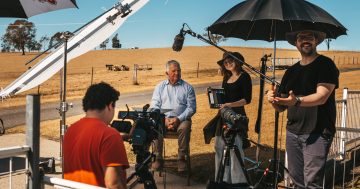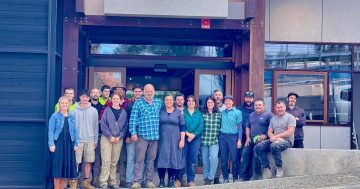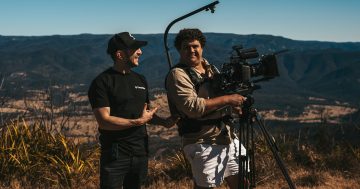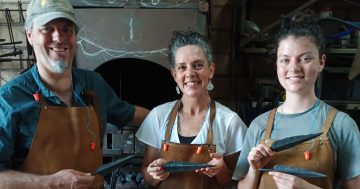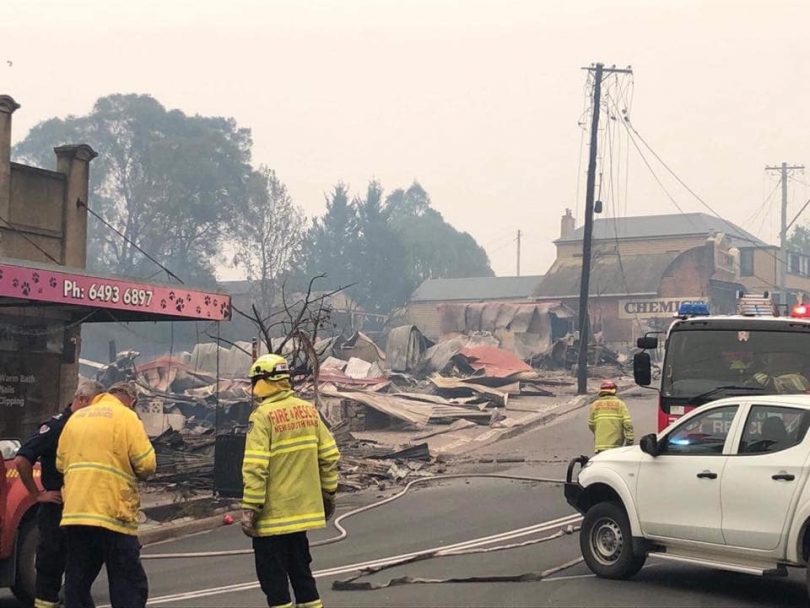
Cobargo’s main street after the bushfires on New Year’s Eve 2019. Photo: Facebook.
A major project to record the voices of those affected by the devastating Badja Forest bushfire has already resonated with people who felt their stories from the disaster still hadn’t been heard.
The National Library of Australia (NLA) is working with the Cobargo Bushfire Resilience Centre (CBRC) and the local community to create an oral history project to tell the stories of those who were affected by the fire.
It will conduct 60 interviews to record the memories and experiences of those affected by the Badja Forest Road Fire in the summer of 2019 – 2020 and is calling for people who want to tell their stories to get in touch.
CBRC vice-chair Ronnie Ayliffe said the oral history project was originally an initiative of her centre and began not long after the bushfires with an aim to capture the stories from the “entirety of the Badja fire”.
Community information sessions about it were held in Cobargo and Quaama on 14 August and Ms Ayliffe said there was a lot of interest there, especially from people who felt their stories hadn’t been heard.
“It’s folk at the fringes who have really taken to this idea,” she said.
These people were often locals who weren’t from the bushfire-devastated town of Cobargo, which received major media attention after the disaster.
Also, they were people who didn’t relate to stories from Cobargo or who felt they had a quiet story, Ms Ayliffe said.
“So folks who may not have lost their house, but lost everything on their farm apart from their house,” she said.
Ms Ayliffe said survivor’s guilt was also a theme that was raised often, with people offering thoughts such as: “Do you really want to hear my story when I didn’t lose my home?”
“Yes, yes we do,” Ms Ayliffe said.

Dr Shirleene Robinson of the National Library of Australia. Photo: NLA.
Dr Shirleene Robinson, director of curatorial and collection research at the NLA, said her library was very aware of the bushfire’s devastating impact on communities and how an enduring historical record of what happened should be preserved for future generations in its national collection.
“Oral history gives voice to people in a very special way and it means that a really wide variety of people can share their stories,” she said.
“The National Library is a leader in the field of oral history and has expert oral historians who are trained in talking to people who have lived through very difficult experiences.
“People who give oral history interviews are able to control who accesses their interviews, for example, they might allow the interview to be open for people to listen to or they might want to restrict access to their interview.”
Dr Robinson said that once the project was completed, the NLA would preserve it in its collection. If access conditions set by interviewees allow, the library can make interviews available to be listened to online through its website.
“We will carefully preserve this material so that future generations will be able to listen to the experiences of what happened with the Badja Forest Road Fire directly from those people who experienced this fire,” Dr Robinson said.
“The National Library is a keeper of Australia’s history and memories and with this project, we will make sure this part of the national story is never forgotten.”
To become part of the oral history project, visit the NLA’s website and submit an expression of interest form.
Trained and experienced oral historians will conduct the interviews. Interviewees will choose what they want to share and will decide who gets to listen to the recording.
Support comes from the NSW Government’s Bushfire Community Recovery and Resilience Fund.







